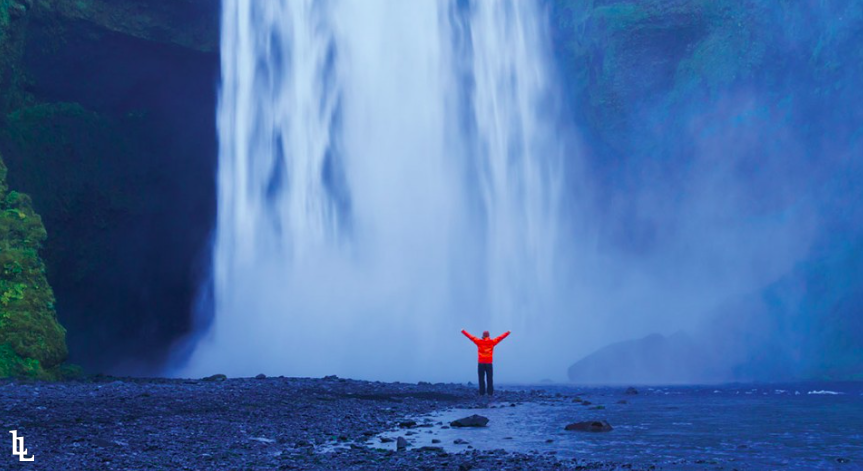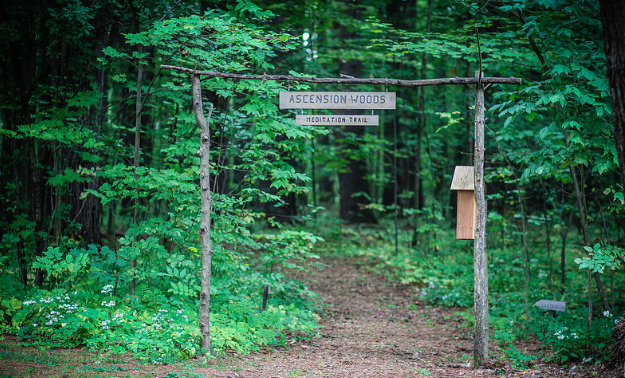Care for the Church and Earth's Waters (Rev. Nancy Wright)
Our theme this month is Water & Worship. Rev. Wright has long been a leader in this space and will release her discipleship handbook, “A Watershed Moment” soon. Here are a few samples from her excellent, upcoming book.
Excerpts from -
A Watershed Moment:
Care for the Church and Earth’s Waters
Introduction
Jeremiah 2:13 “They have forsaken me, the fountain of living water.”
Romans 1:20 “Ever since the creation of the world, [God’s] eternal power and divine nature, invisible though they are, have been understood and seen through the things he has made.”
John 4:10 “Jesus answered her, ‘If you knew the gift of God, and who it is that is saying to you “Give me a drink,” you would have asked him, and he would have given you living water.’”
Matthew 25:35 “I was hungry and you gave me food, I was thirsty and you gave me something to drink.”
We live in a watershed moment for the planet and for the church, the Lutheran denomination, and individual Lutheran congregations. A threatening planetary water crisis asks now for a strong church response. The United Nations recognizes access to water as a human right. Yet, the water crisis on the planet is so severe that the next wars will likely be fought over water. The world is running out of accessible water. By 2030, demand will “exceed supply by 40 percent,” according to current trends.1 Further, climate change will cause more droughts and unpredictable weather, threatening water and food supply around the world, while water pollution and overfishing deplete fisheries worldwide. The church should take up this challenge and recognize the urgent need for transformational leadership in ministry.
The church must respond robustly to the water crisis for at least three reasons. First, Jesus’ life, healings, and teaching modeled care for people in need. He taught, for example, that when his followers feed the hungry and give drink to the thirsty, they are giving food and drink to him, and thus will merit a place in eternal life (Matt. 25:31–46). The church practices short-sighted ministry when it offers food and water as short-term solutions, but does not effectively attend to environmental issues that cause people to be thirsty and hungry.
Second, in recent decades the multilayered environmental crisis has inspired many Christians to rediscover biblical witness to the interrelationship of God and creation: the Psalms envision creation as praising God (e.g., Ps. 148), Jesus taught about God’s deep care for lilies and ravens (Lk. 12:22–31), and early Christians envisioned Christ as holding all created things together (Col. 1:15–20). Reinvigorated ministries and theologies of creation care have emerged in response, a widening flow of which this project is a small but significant, action-oriented part. Finally, churches may well become more effective in offering witness to the Gospel if surrounding communities see them respond helpfully to some of the largest challenges facing humans, plants, and animals, one of which is the worldwide water crisis.
Christians are called to love God by loving creation through sacramental living as well as environmental awareness and care. This project explores that call in the context of a particular congregation...
##
Baptism
Two additional images ground Lutheran discussion of baptism and worship in the present age of environmental abuse. First, Lutheran theologian H. Paul Santmire and others reinforce the difference between the aspiration of ascent toward God, prominent in many images of spiritual growth and especially in light imagery, and the importance of embracing and accepting God’s grace as descending, just as water always seeks lower ground.
Light imagery often fosters a spiritual movement toward ascension and ethereal spiritual life. This ascent imagery may obscure Jesus’ insistence on care for the vulnerable and his teaching that God watches over even a sparrow (Matt. 10:29). The prophet Isaiah, further, announces that God’s effective word falls on the earth as rain and snow, to accomplish what God purposes and to give “seed to the sower and bread to the eater [Is. 55:10b].”
Thus, the image of God’s grace and goodness as falling to earth, nourishing all life, parallels the water cycle when precipitation falls and gives life, then evaporates in an ever-renewing cycle. Just so, God continues to send grace, again, and again. The baptismal practice not only symbolizes through water the spiritual death and rebirth of the person being baptized, but also the spiritually and physically renewing life of God. Therefore, according to Benjamin Stewart, “...the descending imagery [of God’s goodness, wisdom, and fecundity] is expressed by metaphors of flowing water: flowing through, pouring out, and overflowing. The Lutheran emphasis on the action of God has special affinity with imagery of flowing water.”47
Second, such emphasis on flow as central to baptism links Lutherans to the phrase “flowing water,” which the Didache offers as the first choice for baptism for early Christians.48 The Didache specifies that flowing water contrasts with other (cold) water, and if none is available (either flowing or cold), warm water is acceptable. If warm water is not available, water should be poured onto the head three times in the name of Father, Son, and Holy Spirit.
##
The Need for Exposure to Nature
The Connecticut River pilgrims, Louv’s studies, and Underhill’s teaching together celebrate and value exposure to nature on the one hand, and on the other hand, attention to the reality of God as essential, existential contexts for transformational education toward ecological care. Thus, exposure to nature and worship of God provide a horizontal thread in the woven tapestry of transformational education toward creation care, while experienced educators who foster transformation through dialogic teaching methodology provide the vertical dimension in this tapestry.
##
Worship Service Water Litanies
Renewal of Baptism
Holy God, holy and merciful, holy and mighty, you are the river of life, you are the everlasting wellspring, and you are living water.
Thank you for oceans and lakes, for rivers and streams [offer names for which we are grateful]. Thank you for cloud and rain, for dew and snow. Your waters are below us, around us, above us: our life is born in you.
Praise to you for the creatures in the oceans, lakes and rivers. Praise to you for the Jordan River in which Jesus was baptized. Praise to you for the waters in which we were baptized.
At this font, holy God, we pray: Praise to you for the water of baptism and for your Word that saves all in this water. Breathe your Spirit into all who are gathered here and into all creation. Help us to minister in your name so that all people and creatures have the water they need. Illumine our days. Enliven our bones. Dry our tears. Wash away the sin within us, and drown the evil around us.
Satisfy the thirst of your creation and all our thirst with your living water. May we be living water to one another. We pray to you, Jesus Christ, the fountain of living water. Amen.
Prayer of the Day
Dear God, Creator of the Universe, we thank you for the gift of life. We thank you for the gift of water, which makes all life possible. Move us to love these waters as you do. Fill us with a vision of a renewed creation, and give us the will to be faithful stewards of all your gifts. We Pray in the name of Jesus Christ, who brings Living Water, Amen
Respect Water, Protect Water
There are resources inside of us
There are resources outside of us
And water is one of the most precious
The condition of our internal water matters
The hydration of our cells
The fluidity of our emotions
The waters of our psyche
The condition of our planetary water matters
The health of our oceans
The flow of our rivers, streams and creeks
The well being of our underground springs
All species from trees to caterpillars
Humans to river rocks
Interact with and depend on
Water
Mothers of many species
Bring their young to drink and play
At the water’s edge
And from space
The blue green nature
Of our watery planet Is apparent
All of creation knows
And is affected by How we treat water
So when a resource is this crucial
This important
This valuable
How do we behave?
We protect and we respect
Sustainer of All Life
Your flow is within us
And all around us
May we grow in consciousness
Teach us to protect and respect water
May we receive
The wisdom of interdependence and interconnectedness
May we change behaviors
As individuals, as groups
To value the waters of life
May we change policies
As countries and as counties
To value the waters of life
And may we welcome
The inventions
And the changes they will create
That value the waters of life
We pray for the well-being of Planet Earth
Protect Water, Respect Water.*
###
NOTES
1. ”Half the World to Face Severe Water Stress by 2030 unless Water Use is ‘Decoupled’ from Economic Growth, Says International Resource Panel,” United Nations Environment Program, March 21, 2016, accessed February 12, 2018.
47. Benjamin M. Stewart, “The Stream, the Flood, the Spring: The Liturgical Role of Flowing Waters inEco-Reformation,” in Eco-Reformation, 163.
48. Aaron Milavec, The Didache: Text, Translation, Analysis, and Commentary (Collegeville, MN: Liturgical Press, 2003), 19.
*From Respect Water—Protect Water: A Drop of Hope, An Ocean of Love: Facts, Prayers, Actions and Rituals for Water (Vermonters for a Clean Environment, December 2008)
###
Rev. Nancy Wright, pastor, Ascenion Lutheran Church, Burlington, VT, is a true pioneer in ministry and an authority on water's significance in Christian worship. For example: listen to her Living Water sermon (2012), learn about some of the many environmental justice campaigns she's supported, and visit Ascension Lutheran's Facebook page. We are pleased to share these briefs from her upcoming book, "A Watershed Moment: Care for the Church and Earth's Waters" and congratulate her on her most recent academic accomplishments. Thank you, Nancy -- It's an honor to share your work.















